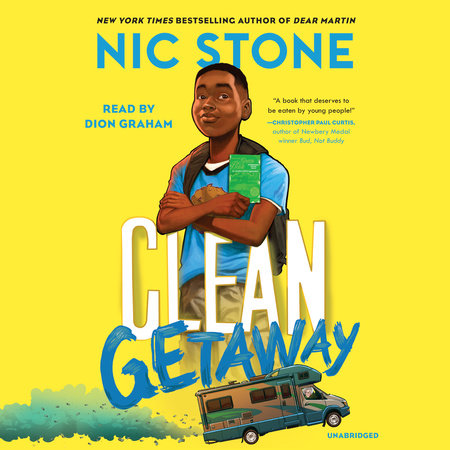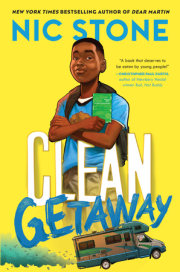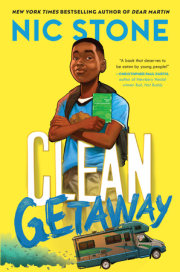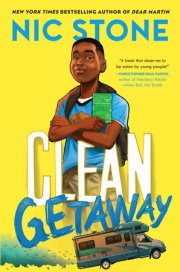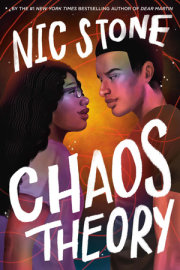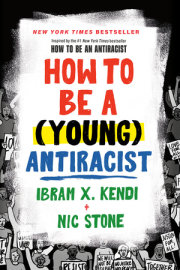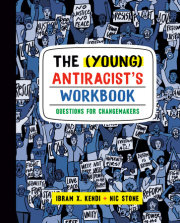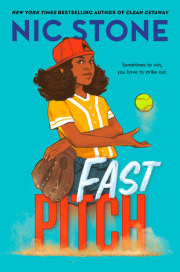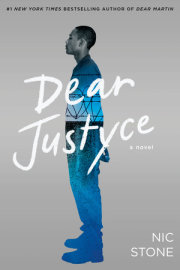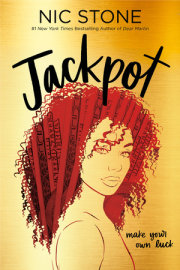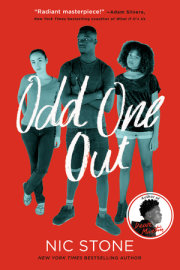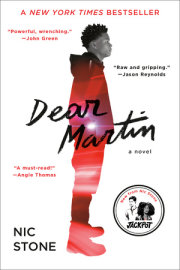1
Quite a Ways to Go
It might sound silly, but to William “Scoob” Lamar, the Welcome to Alabama the Beautiful sign looks . . . well, beautiful. Not as beautiful as his best friend Shenice Lockwood in her yellow sundress, but beautiful enough to make Scoob tip his head back, close his eyes, and sigh into the breeze blowing through the open passenger-side window of G’ma’s Winnebago.
Exhale Dad’s lockdown. Inhale the sweet fragrance of freedom. Which smells like pine mixed with a little bit of truck exhaust.
“You all right over there, Scoob-a-doob?” G’ma says from the driver’s seat. She’s propped up on the gingham-covered foam wedge she uses to see over the steering wheel, pale, polka-dotted little hands perfectly positioned at ten and two. She’s only four feet, eleven inches tall, G’ma is.
Hearing his full nickname makes Scoob cringe. G’ma gave it to him when he was five years old and obsessed with an old cartoon he used to watch at her house about a dog who liked to solve mysteries. G’ma thought it was just too adorable! that he couldn’t pronounce Scooby-Doo. And because Shenice was G’ma’s neighbor, she picked up on the nickname and started using it at school. So it stuck.
Well, the Scoob part did. Which is fine. Kinda cool, even.
Scoob-a-doob, though?
“G’ma,” he says, “you mind if we stick to Scoob? The rest is a little . . . babyish. No offense,” he adds.
“Oh, none taken!” G’ma says. “My apologies, Mr. Scoob.”
“I mean . . . you can drop the mister, too,” Scoob goes on.
This makes G’ma laugh.
Which makes Scoob smile. He’d never tell anybody, but there’s really no sound in the world he loves more than his grandmother’s barking laughter. Dad’s not a fan; says it “grates” on him because it’s the one reminder of G’ma’s past smoking days “and potential future lung cancer,” but it reminds Scoob of elementary school days playing card games she taught him that he wasn’t supposed to know the rules for--like Texas Hold’em and blackjack. Even now, it blows Scoob’s mind that a harsh, booming sound like that could come out of a person as little as G’ma.
“I mean it, though,” she says. “You feeling all right? I’m not driving too fast, am I?” She kicks him a wrinkly wink.
Now Scoob’s the one laughing. He looks up from the brand-new road map she handed him once they were both settled and seat-belted: according to the speedometer, the brand-new Winnebago he and G’ma are in has a max speed of 120 miles per hour, but G’ma has yet to push the needle to 60. “Definitely not too fast, G’ma. Though I do wonder if there’s a minimum-speed-limit law you’re breaking.”
“Oh you hush,” she says. “Speaking of which, you never said if you liked my new sweet ride or not. That’s what you kids call it these days, right? A sweet ride?” She says it in a way that makes her sound like a smarmy used-car salesman with oil-slicked hair.
Scoob chuckles and shakes his head. Then he peeks over his shoulder into the back.
Truthfully, when G’ma popped up out of the blue and asked if Scoob wanted to “go on a little adventure,” he was too geeked at the thought of a loophole in his punishment to give much thought to anything else, their destination included. Especially when she said he’d “probably miss a couple days of school.” (Bonus!) He finished item three--empty the dishwasher--on the to-do list Dad left for him on the kitchen whiteboard every day, and grabbed his suitcase. Then, after scribbling Dad a quick note about being with G’ma “for the night,” Scoob hightailed it out of the house as fast as his off-brand-sneaker-clad feet would carry him. Even left his phone at home.
Largely so Dad can’t call him, but he won’t tell G’ma that.
The suitcase had been sitting in Scoob’s closet for a month. Dad promised Scoob a trip to St. Simons Island this year--Scoob’s first choice was Universal Studios, but Dad said Scoob was “too old for all that.” (He’d been “too young” the previous year, but whatever.) So Scoob packed up according to Dad’s specifications three days before they were supposed to depart.
Except they didn’t go. Scoob got in trouble at school, and voilà: trip canceled. Lockdown commenced. Spring break ruined before it could begin.
Scoob hadn’t been able to bring himself to unpack the bag, so he hid it. Now he can see it sitting on the seat of the dining booth in G’ma’s new sweet ride.
Scoob was in such a rush to get out, it didn’t fully *click* that he and G’ma weren’t in the MINI Cooper until she asked him to get out of his seat--while the vehicle was in motion--and “grab a GPS from the fridge” (that’s Grandma Protein Shake, otherwise known as Ensure) for her.
Fridge? Scoob thought, lightbulb slowly illuminating.
That’s when he looked behind him for the first time. And almost choked on the gum that shot down his throat when he gasped.
“Ain’t he handsome?” G’ma said, smacking the dashboard twice. “Brand spankin’ new, this fella. I’ve decided to call him Senior after your late grandfather. He and I had a Winnebago back in the day before your dad was born and your G’pop--” She paused. Then: “Anyway, I ain’t gettin’ any younger. Sold my house and bought this baby--”
“You sold your house?” Scoob said, stunned.
“Sure did. Fetched a pretty penny for it, too. God bless home equity and hipsters lookin’ to ‘revitalize’ or whatever the heck they’re calling it.”
“Wow.” (Was there anything else he could’ve said? She sold her house!)
“Well, ya gonna get me a GPS or not?”
Scoob gulped, removed his seat belt, and made his way to the back. Dad would’ve breathed fire and shot smoke out of his ears if he’d been around to see.
As he opened the for-real, for-real fridge--with separate freezer!--G’ma gave him a rundown of “Senior’s” features. “You see those lights above your head?”
Scoob looked up. “Yeah . . .”
“Those are LEDs,” she said. “Real state-of-the art! There’s also a microwave, a two-burner cooktop, and two ultra-HD TVs where you can watch anything! Rated PG-13 or lower, that is.”
Scoob rolled his eyes.
G’ma pushed on. “Bathroom’s there to the left of the mini-pantry--got a flushing toilet and a shower! And that dining booth you see there? Doubles as a bed. And speaking of beds, there’s one in the rear for me, and one for you right above the cab here. There’s a window up there and everything, kiddo!”
Scoob could hear the proud smile in her voice.
Which made him smile too. Despite the fact that she’d called him kiddo.
As he grabbed the drink for G’ma and saw that the fridge was fully stocked, Scoob realized he’d never again play on the old tire swing in G’ma’s backyard or kick back on the old window seat in the attic with his favorite book. When it hit him that this, this bizarre truck that contained everything a person needs to live, this thing was now G’ma’s house?
Creepy.
G’ma’s fingers do a tap dance on the steering wheel, pulling him back into the present, and he takes a deep breath and lets his eyes continue to roam around the open space behind him. It’s so weird to him that if he has to pee, all he’s gotta do is walk like fifteen feet to the little bathroom. And it flushes? Where does the stuff even go? It’s not like they’re connected to a sewer. And what about the dirty dish and shower water?
G’ma’s house had one of those old-school bathtubs with the fancy metal feet, and Scoob secretly loved to get in with one or two of the lemon-sized balls G’ma would buy that would fizz up like Alka-Seltzer and turn the bath all kinds of wild colors. Plop! Fizzzzzzz . . . and the water would be blue and kind of shimmery. Like taking a soak in the galaxy.
This RV doesn’t have a tub. So no more galaxy baths.
His gaze catches on the kitchenette thingy as he faces forward. Which just adds to his sudden sadness. He can’t imagine G’ma making her blue-ribbon-winning cast-iron French toast--first pan-toasted, then baked in the pan for a few minutes for extra crispiness on the outside--on that rinky-dink cooktop thingy. No more extra-sweet Arnold Palmers on the porch swing. No more reading in front of the fire.
In all honesty, the RV gives Scoob the willies. But of course he can’t tell G’ma that. Not when she’s so excited about it.
“Well?” she says, taking her baby-blue eyes off the road to look at him. Second only to Shenice’s honey-brown ones, G’ma’s got the prettiest eyes Scoob’s ever seen. “What do you think, kiddo?”
Scoob traces the handle of his door and gulps down his true feelings. “I think it’s great, G’ma!” he says with forced enthusiasm.
Whether or not she can tell he’s lying, Scoob doesn’t know.
“Good,” she says. “Settle on in. We’ve got quite a ways to go.”
2
Pay the Bill
The trouble really started six months back during those weird three weeks of school between Thanksgiving and winter break. Scoob’s got no idea why, but over the course of that stretch, Bryce Benedict--a kid Scoob used to be friends with (“until he started playing ‘footyball’ and got too big for his britches,” G’ma likes to say)--started picking on Shenice’s little brother, Drake.
Drake has epilepsy--which was never a big deal until Bryce’s antics began.
Things started pretty light: Bryce would make unnecessary detours past Scoob, Shenice, and Drake’s table in the cafeteria to tap Drake on the back of the head as he’d shout “ ’Sup, Drakey-Drake?” loud enough for the whole room to hear.
After a few days of this, the tapping turned to shoving, turned to smacking. There was one morning Bryce hit so hard, Drake cried out in pain. The nearest teacher hadn’t been paying attention--if she had been, Bryce probably wouldn’t have done it. But when she turned to see what’d happened, Bryce was gone and Drake said nothing.
So no one else said anything either.
The following day, Bryce cornered Drake in the hallway to taunt him. Scoob arrived just as Drake’s arms jerked of their own accord and he dropped all the books he was holding.
Of course old Bryce found this--and Shenice’s protective punch in the chest--hilarious.
He shoved Drake’s shoulder--hard--and walked off just as Scoob rushed over to help Shenice and Drake with the books. As they gathered everything, Scoob could tell Drake was fighting with everything he had to keep from crying.
Shenice was crying.
For the first time in his life, Scoob experienced a violent urge: he wanted to smack Bryce upside his fat head.
“Whew,” G’ma says as Scoob relays the story to her over an early dinner. They’re at a place called DamnYankees, and the lemon pepper wings truly are smokin’, just like the menu says. Decor’s a bit . . . country: rodeo posters and horseshoes and cowboy hats all over the walls, lassos and saddles hanging from the ceiling. There’s even a mounted bull’s head, massive horns menacingly outstretched. “Can’t blame ya, Scoob-a-doob,” G’ma continues.
Scoob sighs, grateful some grown-up in his life seems to understand. “I knew you’d get it, G’ma.” Because she always does.
“What’d Drake have to say?” G’ma asks.
“He shrugged it off. Said ‘He’s just being a bully.’ Which made me even madder.”
“I bet. Hard seeing someone you care about brush that kinda thing off, ain’t it?”
Scoob nods. “It really is.”
As the days wore on, Bryce’s taunting got more intense. One day after school, Shenice confided in Scoob that Drake hadn’t been sleeping real well. That he’d been having bad dreams, and she was pretty sure they had to do with Bryce picking on him. That he’d been having more seizures despite taking his medicine like he was supposed to.
“That’s when I started noticing that Drake would, like . . . blank out at random times,” Scoob says to G’ma. “There was even a day someone was talking to him at the lunch table and he didn’t respond. Just sat staring straight ahead.”
People had looked around at each other and started whispering.
And on Drake sat, perfectly still. Blinking. Blinking. Blinking.
“Bryce passed by and hit him, and Drake’s whole body lurched forward like a board. Which Bryce thought was hilarious.” Scoob’s eyes narrow as the anger begins to simmer again. “He pointed one of his fat, pink fingers at Drake and laughed. Imitated Drake’s blinks. ‘Looks like he’s having one of his “seizures,” ’ he said. Did air quotes and everything.” Scoob shakes his head.
G’ma shakes hers, too.
“Then he said, ‘Too bad it’s not the type where he shakes and his tongue falls out . . .’ And he stuck his big, ugly tongue out and pretended to convulse. Shenice jumped up and said something I won’t repeat, and then Bryce looked at her like the evil villains do in the cartoons just before they hurt people. When he took a step toward her, I--” Scoob sighs. “I lost it, G’ma. Just kinda . . . snapped.”
Scoob will never forget hearing Ms. Manasmith gasp as he leapt from his seat, hopped the table, and tackled Bryce.
Then they were on the floor. Bryce on his back. Scoob on top of him.
Punching.
Punching.
Punching.
Scoob’s got no idea how long he punched. He just knows that at some point, one of the punches failed to connect because he was flying up, up, up. And by the time his surroundings came into focus, there was no longer a youngish white lady staring at him, but a little old brown-skinned dude.
Mr. Armand. The principal of Casey M. Weeks Magnet Middle School.
Soon, that dude was joined by a BIG, slightly lighter-brown-skinned dude: Dr. James Robert Lamar Jr.
Scoob’s father.
“And that was the beginning of the end,” Scoob says to G’ma as he rips another hunk of lemony-peppery meat from a chicken leg.
“The end of what exactly?” G’ma’s eating raw oysters. Scoob shuts his eyes as she picks up a shell and tips the glob-of-gross into her now-snaggletooth mouth. She removed her “partial.” The thought of the false teeth currently chillin’ in their purple glitter container inside G’ma’s purse almost grosses Scoob out as much as the oysters.
Scoob shudders and takes a sip of sweet tea to clear his head. “Sorry, what was the question?”
G’ma smiles. “You said the fight with Bryce the bonehead was ‘the beginning of the end.’ The end of what?”
“Oh,” Scoob says, lowering his eyes to his near-empty plate. “The end of . . . well, Dad’s faith in me, I guess.”
Copyright © 2020 by Nic Stone. All rights reserved. No part of this excerpt may be reproduced or reprinted without permission in writing from the publisher.

